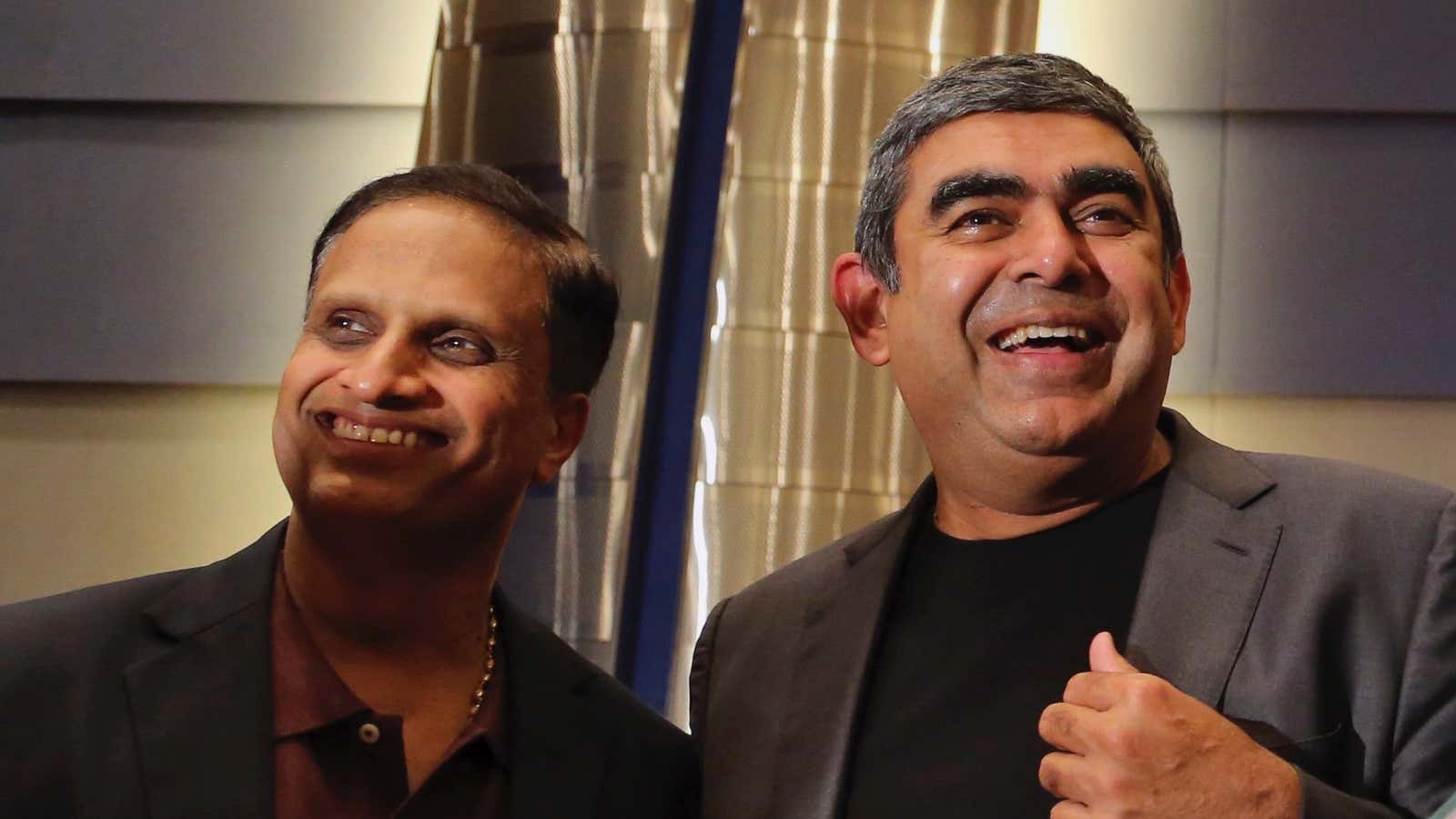Barely two months after the company’s first public boardroom brawl, Infosys co-founder NR Narayana Murthy is back at it again.
Making a case for “compassionate capitalism,” Murthy on April 03 argued that senior-level executives have to “fight for maintaining a reasonable ratio between the lowest salary and the highest salary in a corporation in a poor country like India.” Citing his own example, Murthy wrote in a letter to prominent media houses that he took a deep salary cut when Infosys was founded, but chose to pay lower-level employees higher wages than their previous jobs and offered them “huge equity compensation.”
Murthy was responding to the Infosys board’s recent approval of a pay hike for chief operating officer UB Pravin Rao.
At its Feb. 23 meeting, the board included an annual fixed compensation of Rs4.62 crore and variable compensation of Rs3.88 crore as well as stock compensation worth Rs4 crore based on Rao’s performance. At the end of March, shareholders backed the decision. However, Murthy was not on board with the raise and made his discontent more than apparent in a public letter.
V Balakrishnan, a former chief financial officer at Infosys, echoed Murthy’s sentiments, saying that a pay hike for top-level employees is “terrible for any leadership to do” when they are asking subordinates to “sacrifice” wages.
However, others say that times have changed and so have the companies. “It is highly uncalled for. He is making a mountain out of [a molehill]. If we compare the hike in salary of Pravin Rao with the industry peers, it is not very high,” Ican Investment founder and chairman Anil Singhvi said. “To say now that we always took very low salaries and all that is all humbug. Those were the different days and he had a huge amount of shares in the company.” Singhvi added that Rao is being paid in accordance with “his professional competencies and what peer-compensation packages would be” and the media should “ignore” Murthy.
While acknowledging the “important feedback” from Murthy, Infosys defended its decision, saying the cash component of Rao’s compensation had been sliced from Rs5.2 crore to Rs4.6 crore, according to Mint. The performance-based component had been increased from 45% to 63%. Given the four-year vesting period of the stock given to Rao, the effective hike for this calendar year amounts to just 1.4%. The software giant also said that it revised the payouts for several senior leaders in a bid to retain talent.
The hullabaloo over Rao’s salary is yet another sign that Murthy and other co-founders may have bid adieu to India’s second-largest technology company in 2014 but they aren’t done commenting on how things are run. This wasn’t the first time that the founders put the company’s reputation on the line by running it down publicly.
In early February, the founders leveled allegations of poor governance. They raised issue over the hefty Rs49 crore salary paid to CEO Vishal Sikka and the generous severance packages for former CFO Rajiv Bansal and former chief compliance officer David Kennedy.
Despite the flare-up, Sikka has proven himself as a leader. A major part of India’s $160-billion IT sector’s revenue is reliant on business from North America. Infosys, by far the largest applicant for H-1B visas in the US, has long relied on providing mundane back-end services. However, Sikka has been steering it towards automation and operational efficiency, placing bets on high-margin areas like artificial intelligence and digital technology. Since he took the reins, profits and revenues have ticked up.
For a company that has seen a slew of executives quitting, Sikka’s guidance was a much-needed boost. He rolled out 5,000 promotions within his first week at the job, engaged with employees through initiatives such as “Murmuration“—a program to crowd-source ideas from employees—and made the office “cool” by relaxing dress codes and taking away the taboo of using social media at work.
